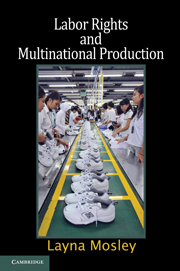Book contents
- Frontmatter
- Contents
- Tables and Figures
- Acknowledgments
- 1 Workers in the Global Economy
- 2 Producing Globally
- 3 Inside and Out
- 4 Conceptualizing Workers’ Rights
- 5 The Overall Picture
- 6 Varieties of Capitalists?
- 7 Labor Rights, Economic Development, and Domestic Politics
- 8 Conclusions and Issues for the Future
- Appendix Data and Coding
- References
- Index
2 - Producing Globally
Published online by Cambridge University Press: 05 June 2012
- Frontmatter
- Contents
- Tables and Figures
- Acknowledgments
- 1 Workers in the Global Economy
- 2 Producing Globally
- 3 Inside and Out
- 4 Conceptualizing Workers’ Rights
- 5 The Overall Picture
- 6 Varieties of Capitalists?
- 7 Labor Rights, Economic Development, and Domestic Politics
- 8 Conclusions and Issues for the Future
- Appendix Data and Coding
- References
- Index
Summary
A hallmark of the contemporary international system is the multinational nature of production: Goods and services are produced in a variety of locations, as different nations – and different regions within nations – specialize in varying types of production. As a result of both technological and policy changes, developing nations increasingly participate in global production networks, receiving substantial amounts of foreign direct investment (FDI), participating as subcontracting partners, and importing and exporting a variety of commodities.
It is this expansion of global production, both in terms of its scale and its geographic scope, that has generated interest in the causal linkage between multinational corporations (MNCs), on the one hand, and labor and human rights outcomes, on the other. A long literature has explored the bargaining relationship between multinational firms and national governments (potential or actual host countries). Much of this literature takes as its starting point a concern with the asymmetry in bargaining power: Firms are able to choose from a variety of production locations, and their technologies tend to be cutting-edge; developing country governments are anxious to attract capital as well as to promote employment growth and the transfer of new technologies.
- Type
- Chapter
- Information
- Labor Rights and Multinational Production , pp. 17 - 45Publisher: Cambridge University PressPrint publication year: 2010



